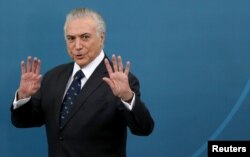A federal court sentenced Brazil's former speaker of the lower house, Eduardo Cunha, to more than 15 years in prison on Thursday for corruption, making him the highest-profile political conviction yet in the "Operation Car Wash" scandal.
The former politician's defense team said they would appeal the decision but Cunha will remain imprisoned pending appeal.
Cunha, who drove the successful impeachment of former President Dilma Rousseff, was forced from his position as speaker in July and arrested in October on accusations he received millions in bribes from the purchase of an oil field in Benin by state-run oil company Petrobras.
Over 200 people have been charged in the “Operation Car Wash” probe, a far-reaching investigation that centers on bribes and political kickbacks from contracts at Petrobras. The Supreme Court is likely to approve soon the investigation of dozens of sitting politicians.
In February 2015, Cunha, a member of President Michel Temer's Brazilian Democratic Movement Party (PMDB) that for a decade was the main member of left-leaning Workers Party (PT) governments, defied the wishes of his own coalition to run for and win the speakership of the lower house of Congress.
'Political persecution'
Just six months later, he officially broke with the PT government of Rousseff, saying that she was using the Petrobras investigation as a tool of “political persecution” against him.
As speaker, only Cunha could allow impeachment proceedings to begin against Rousseff, whom critics accused of breaking budgetary laws.
He did just that in December 2015, just hours after PT deputies cast deciding votes for him to face an investigation by the House's ethics committee for lying about bank accounts he and his wife held in Switzerland.
By May, Rousseff was impeached and Temer installed as successor. But Cunha could not shake free of corruption allegations that eventually led to his downfall.
Cunha faces another charge
Once he was kicked out of congress, Cunha lost the privilege given to sitting politicians that only the badly overburdened Supreme Court can try them.
His case was instead sent to crusading anti-corruption judge Sergio Moro, who has been the driving force behind Brazil's fight against graft. Moro has a reputation for plowing through cases efficiently, with over 98 percent of his convictions in Car Wash cases being upheld by higher courts.
Cunha faces another trial for allegedly receiving $5 million skimmed from Petrobras contracts for two drill ships in 2006 and 2007.






